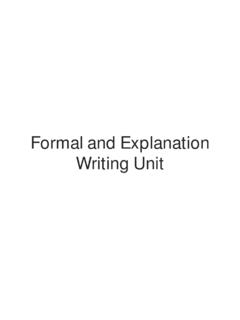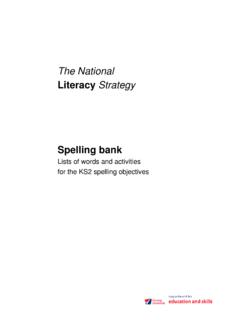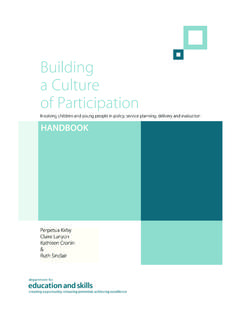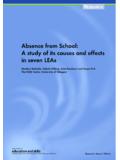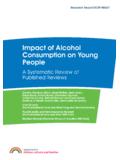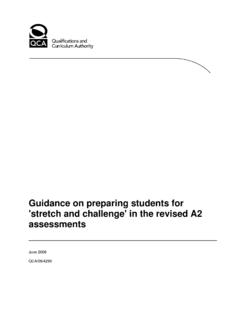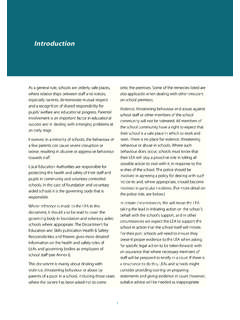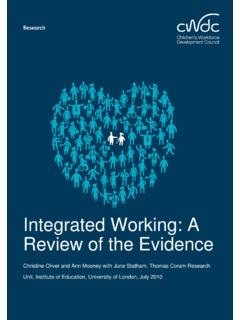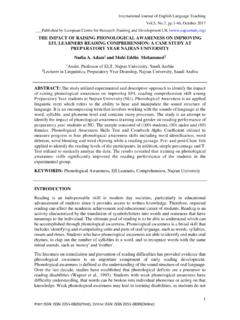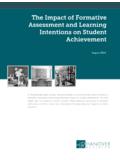Transcription of TIME FOR STANDARDS - UCL Institute of Education
1 raising STANDARDS and tackling workload: a national agreement time FOR STANDARDS . ATL, DfES, GMB, NAHT, NASUWT, NEOST, PAT, SHA, TGWU, UNISON, WAG. 15 January 2003. 1. INTRODUCTION. 1. This document represents an historic national Agreement between Government, employers and school workforce unions to help schools, teachers and support staff meet the challenges that lie ahead. It promises joint action, designed to help every school across the country to raise STANDARDS and tackle workload issues. Action will take place across England and Wales and will take account of the different circumstances from school to school. 2. Proposals in this Agreement for changes to the School Teachers' Pay and Conditions Document will apply equally to teachers in England and Wales.
2 As set out in this Agreement, the Welsh Assembly Government supports the need for school workforce reform as a means of delivering contractual change and, in line with the devolution settlement, will determine how this is best achieved in Wales, in partnership with relevant employers and unions. Context 3. We have the best generation ever of teachers and headteachers, as evidenced by Ofsted and Estyn and they are supported by an expanding and highly effective cadre of support staff. Pupils are working harder than ever before and STANDARDS of achievement are rising. But the Education service cannot afford to stand still. We need to find new ways, for the 21st century, of helping schools to realise the potential of all our children and to ensure the nation is competitive in a rapidly changing world.
3 4. As the Government's pamphlet Professionalism and Trust explained, the next phase of raising STANDARDS will place greater demands on teachers than ever before. There will be increasing emphasis on the pupils who require the greatest help and for whom teachers will need to prepare more differentiated material. 5. Teaching is a profession used to adapting to the demands of the economy and society. Before the Second World War, many jobs did not even require basic literacy. By 2010, more than 80% of new jobs will require qualifications of NVQ level 4 or above. This will pose new, even greater challenges for the school workforce. 6. Many teachers are already leading the way in adapting to these new demands.
4 They are using informed professional judgement to create new models of teaching and learning that will benefit all schools and ensure that teaching is recognised for what it is: an innovative and expert profession. But teachers will not be able to make further progress on raising STANDARDS for pupils unless we can free them from the shackles of excessive and inappropriate workload. 7. The nature of that workload was made clear by the independent study by PricewaterhouseCoopers (PwC). Rising demands on teachers' time have added increasing non-teaching burdens: two-thirds of a teacher's time is now spent on activities other than teaching.
5 The profession has suffered recruitment and retention difficulties as a result. 8. Following the PwC report, the School Teachers' Review Body made a series of proposals for reducing excessive workload, including through changes to the teachers'. contract. In responding to these proposals, the Government has entered into detailed discussions with national partners and through the time for STANDARDS package, with the aim of reaching Agreement on the nature and implementation of reforms that would turn the tide on teacher workload. 9. This Agreement is intended both to raise STANDARDS and to tackle teacher workload. 1. The Signatories to this Agreement recognise that it is not possible to address one part of this equation without addressing the other.
6 The contractual changes set out in this document will not be delivered unless schools deploy more support staff in extended roles, as a means of releasing the extra time for teachers and reducing their workload. The way ahead 10. The Agreement includes a seven point plan for creating time for teachers and headteachers and therefore time for STANDARDS : i. Progressive reductions in teachers' overall hours over the next four years. This objective will be promoted by all the partners and progress will be monitored and audited, including at school level;. ii. Changes to teachers' contracts, to ensure all teachers, including headteachers: Do not routinely undertake administrative and clerical tasks.
7 Have a reasonable work/life balance;. Have a reduced burden of providing cover for absent colleagues;. Have guaranteed planning, preparation and assessment time within the school day, to support their teaching, individually and collaboratively;. Have a reasonable allocation of time in support of their leadership and management responsibilities;. and that headteachers have dedicated time which recognises their significant leadership responsibilities for their school. iii. A concerted attack on unnecessary paperwork and bureaucratic processes for teachers and headteachers, including in England through the establishment of an Implementation Review Unit.
8 Iv. Reform of support staff roles to help teachers and support pupils. Personal administrative assistants for teachers, cover supervisors and high level teaching assistants will be introduced;. v. The recruitment of new managers, including business and personnel managers, and others with experience from outside Education where they have the expertise to contribute effectively to schools' leadership teams;. vi. Additional resources and national change management programmes, to help school leaders achieve in their schools the necessary reforms of the teaching profession and restructuring of the school workforce; and vii. Monitoring of progress on delivery by the Signatories to this Agreement.
9 11. This plan is explained in more detail in sections 3 and 4. 12. This phase of reform will last until 2006 but further reform is likely to be needed beyond that. The parties to the Agreement will keep that issue under review. 2. Implications for support staff 13. This Agreement will also have significant implications for support staff and other professional staff in schools. Support staff will be increasingly recognised for the contribution they make to raising pupil STANDARDS . Bursars, administrative, technical and classroom support staff will all be important members of the school team. 14. These support staff will have access to expanded roles and improved choices and career opportunities, including proper recognition for existing responsibilities.
10 The National Joint Council for Local Government Services' Working Party on school support staff is developing a national framework, including good practice guidance, covering the employment of support staff in schools. Resources 15. Government has recognised its responsibility to provide additional resources in support of the Agreement. In England, this funding will ensure that the Government meets its manifesto pledge of at least an extra 10,000 teachers during this Parliament. It also estimates that schools will be able to appoint at least 50,000 extra support staff of all types during the same period. A detailed statement about resources in England is at appendix 1.
